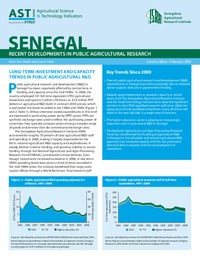Authors:
Stads, Gert-Jan; Sène, Louis
Year:
2010
Publisher
International Food Policy Research Institute (IFPRI); and Senegalese Agricultural Research Institute (ISRA)
Back to:
Over the past few decades, agricultural R&D in Senegal has relied heavily on donor funding, including consecutive projects led by the World Bank. Reduced support by donors and the Senegalese government has led to a gradual drop in the country’s overall agricultural R&D spending. The World Bank-led project PSAOP has supported substantial institutional change at the main public agricultural agencies, ISRA and ITA, and introduced a competitive funding body (FNRAA), which has transformed agricultural R&D funding and promoted the involvement of the higher education and private sectors in national agricultural research. Given that FNRAA regulations prevent donors from funding fixed research costs, and the national government has been unable to fill a growing funding gap, both ISRA and ITA will need to further rationalize their operations and develop alternative sources of
funding.
Despite significant investments in human resource capacity under PSAOP, ISRA and ITA have experienced serious losses in their research capacity over the past five years. Key factors of concern are the aging population of scientists at ISRA and ITA, and disparities in salary levels at these two agencies compared with those of the higher education and private sectors, which make it difficult for the public agencies to retain well-qualified staff despite substantial training initiatives.
On a positive note, despite the erosion of R&D funding levels and human resource capacity, Senegal’s agricultural researchers remain among the most highly qualified in Africa, and the country’s agricultural research intensity levels remain well above the average for Africa.

